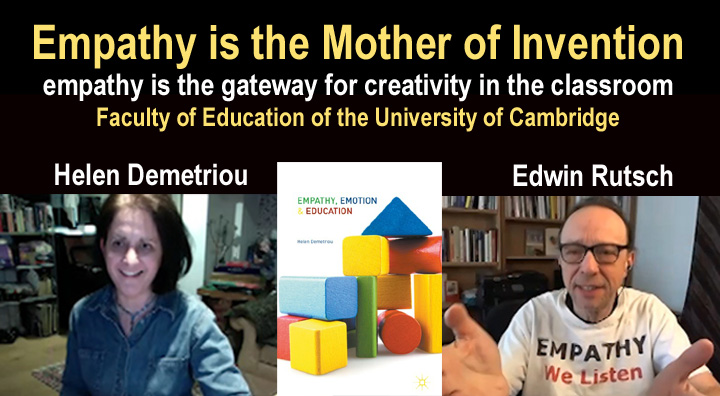|
|
|
Culture of Empathy Builder: Helen Demetriou
Links
Empathy can be taught at school, and it can lead to creative
thinking.
By Helen Demetriou, University of Cambridge
"Most people think that empathy – the ability to put yourself
in another person’s shoes – is fixed, but it’s not. Empathy can be taught. Research
has shown that
reading can help children develop empathy. Through reading, children can
experience the situations of others that are very different to their own, and
reflect on that experience."
Demetriou, H. & Nicholl, B. (2021: in press): Empathy is the mother of invention: emotion and cognition for creativity in the classroom. Improving Schools. According to the age-old proverb from Plato’s Republic: necessity is the mother of invention, the main motivation for creating new discoveries is the need for them. However, as well as the necessity factor, we argue that a very important aspect that influences invention and creativity is the empathy factor. This mixed methods research investigated the impact of empathy instruction on the social and emotional skills of creativity in the UK Design and Technology (D&T) classroom. Pupils in year 9 (aged 13 to 14 years) from two schools were assessed for their creativity levels using the Torrance Test of Creative Thinking (TTCT) both at the start and at the end of the academic school year. In the intervening period, whereas the control school continued as normal with its usual D&T lessons, the intervention school’s D&T lessons were replaced by a creativity tuition kit called Designing Our Tomorrow (DOT), which involves instruction in empathising. Pupils from year 7 (aged 11 to 12 years) in a third school were given the DOT task alone and interviewed about their experiences of it. Results showed that unlike the control school, whose emotional and cognitive creative scores in fact decreased over time, the intervention school increased in its levels of emotional and cognitive creativity, as measured by the TTCT. These quantitative as well as the subsequent qualitative interview findings and pupils’ portfolios suggest that creativity can be taught and particularly via instruction that advocates the importance of empathising with the subject matter.
To Boost Creativity, Cultivate Empathy Feb 03, 2021 "A new University of Cambridge study suggests that encouraging students in a
classroom setting to engender empathy boosts their creativity. These findings
(Demetriou & Nicholl, 2021) were published on January 25 in the peer-reviewed
journal Improving Schools."
Empathy-Oriented Teaching Fosters Creativity, Study Finds
|
|
||||






